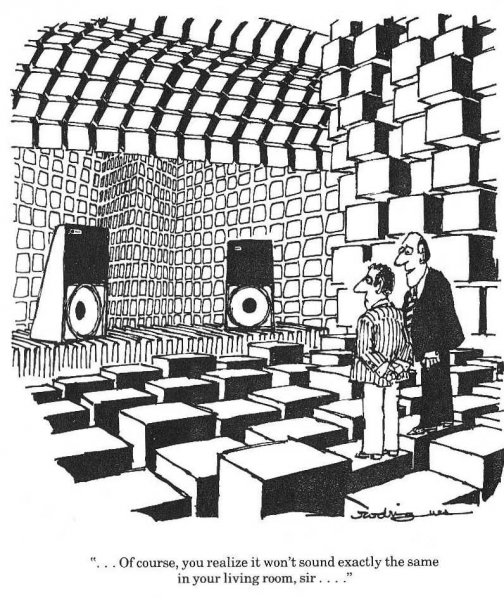But I also think there are lots of people between the ages of 40 - 60 who no longer have the obligations of children and are beginning to think more of their own needs. I believe many of these people have never been exposed to a really good stereo system and are also potential clients.
Amir, this is another opportunity for you. Just down the road you have the Maserati dealer, the Ferrari dealer, the Bentley dealer, the Jaguar dealer. Make a deal with them to set up systems in their waiting rooms in exchange for leaving your calling card. It's all about exposure to the right people. Most have never been exposed to a really good stereo system, and it doesn't take much to get them hooked. It should be an entry-level system that must not cost much more than the upgrade on the sound system in the cars they are considering.
Unfortunately, my stuff is too expensive, otherwise I'd work with you to get more exposure. We've had people walking into the factory, hear the system playing background music in my reception area, and stand there mesmerized. But when they hear that it's a $10,000 system, they mentally turn off. You need to get them to be mesmerized with a $2,000 system, and as Jack suggested the Paradigm Titan/Sonus/iPOD system might just be the ticket. They shouldn't need to be told that it's better than a consumer system. They should know it for themselves - and they will if they love music.
I discovered why wives don't like the hifi system in the living room when I was dating, and the expensive system I owned then didn't get me to score more often even with women I met at concerts and jazz bars who loved music - you make them feel uncomfortable when there is one sweet spot. If you sit in the sweet spot to share music with them, you make them feel like you are being demeaning. If you give up the sweet spot to them, they feel that you are being condescending.
It's the same with wives - one customer I visited and became friends with him and his wife when I convinced him to throw out the listening seat and buy a couch - the couch that the wife wanted so that she could spend time with him reading her book or knitting when he's listening to music. That was over 5 years ago. He went from my $20,000 loudspeaker that his wife didn't want him to buy because it was selfish, to my $80,000 loudspeaker that his wife wanted him to buy because now she can be with him when he's listening to music. He is away from home on business 3 weeks out of a month, so she now values her time with him even more. And his former loudspeakers are now the basis of a $60,000 home theater for the wife in the living room. That's over $100k in sales for the dealer - all with a $3,000 couch.
My epiphany in audio came years before I got into the business - when I managed to broaden the sweetspot (I was using the Maggie 3.5's then) to encompass a loveseat and two people, I also enjoyed the system and the music much more because I could lounge on a comfortable couch to enjoy the music even though with the tweeters on the outside and the broader sweet spot, the absolutely best was not as good as it was with a narrowly focused sweet spot. I could then comfortably listen to the same system critically, as well as background music while doing something else. I also enjoyed music more when I could share the music with someone.
Jack's suggestion about the comfortable home environment (and without shoo-ing his kids away) is a very important point. Sometime ago, I suggested to a dealer to put a kid's padded play area in his store with speakers sitting on the floor and a LCD monitor playing kid's movies. It leaves the young parents to shop and the dealer to close the deal while keeping the kids distracted (oh, and when you install the home theater, throw in a system for my kids too.)
.


